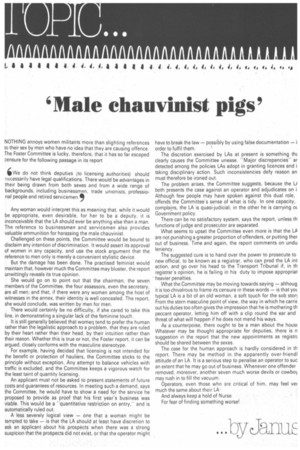' Male chauvinist pigs'
Page 64

If you've noticed an error in this article please click here to report it so we can fix it.
NOTHING annoys women militants more than slighting references to their sex by men who have no idea that they are causing offence. The Foster Committee is lucky, therefore, that it has so far escaped censure for the following passage in its report
6, We do not think deputies (to licensing authorities) should necessarily have legal qualifications. There would be advantages in their being drawn from both sexes and from a wide range of backgrounds, including businessmen, trade unionists, professional people and retired servicemen.,
Any woman would interpret this as meaning that, while it would be appropriate, even desirable, for her to be a deputy, it is inconceivable that the LA should ever be anything else than a man. The reference to businessmen and servicemen also provides valuable ammunition for harassing the male chauvinist.
Challenged on these points, the Committee would be bound to disclaim any intention of discrimination. It would assert its approval of women in any capacity, and use the stock argument that the reference to men only is merely a convenient stylistic device.
But the damage has been done. The practised feminist would maintain that, however much the Committee may bluster, the report unwittingly reveals its true opinion.
She would go on to point out that the chairman, the seven members of the Committee, the four assessors, even the secretary, are all men; and that, if there were any women among the host of witnesses in the annex, their identity is well concealed. The report, she would conclude, was written by men for men.
There would certainly be no difficulty, if she cared to take this line, in demonstrating a singular lack of the feminine touch.
It is still generally believed that women tend to prefer the human rather than the legalistic approach.to a problem, that they are ruled by their heart rather than their head, by their intuition rather than their reason. Whether this is true or not, the Foster report, it can be argued, closely conforms with the masculine stereotype.
For example, having decided that licensing is not intended for the benefit or protection of hauliers, the Committee sticks to the principle without exception. Any attempt to balance vehicles with traffic is excluded, and the Committee keeps a vigorous watch for the least taint of quantity licensing.
An applicant must not be asked to present statements of future costs and guarantees of resources. In meeting such a demand, says the Committee, he would have to show a need for the service he proposed to provide as proof that his first year's business was viable. This would be a "quantitative restriction on entry," and is automatically ruled out.
A. less severely logical view — one that a woman might be tempted to take — is that the LA should at least have discretion to ask an applicant about his prospects when there was a strong suspicion that the peospects did not exist, or that the operator might have to break the law — possibly by using false documentation — order to fulfil them. ■ The discretion exercised by LAs at present is something ON clearly causes the Committee unease. "Major discrepancies" ar detected among the policies LAs adopt in granting licences and i taking disciplinary action. Such inconsistencies defy reason an must therefore be ironed out.
The problem arises, the Committee suggests, because the U both presents the case against an operator and adjudicates on i Although few people may have spoken against this dual role, offends the Committee's sense of what is tidy. In one capacity, complains, the LA is quasi-judicial; in the other he is carrying CL Government policy.
There can be no satisfactory system, says the report, unless th functions of judge and prosecutor are separated.
What seems to upset the Committee even more is that the U2i are not punishing a greater proportion of offenders, or putting ther out of business. Time and again, the report comments on undu leniency
The suggested cure is to hand over the power to prosecute to new official, to be known as a registrar, who can prod the LA int action, and go over his head to the Transport Tribunal if, in th registrar's opinion, he is failing in his duty to impose approprial heavier penalties.
What the Committee may be moving towards saying — althoug it is too chivalrous to frame its censure in these words — is that yot. typical LA is a bit of an old woman, a soft touch for the sob stop From the stern masculine point of view, the way in which he carri€ out his duties too often gives the impression that he is mothering th peccant operator, letting him off with a clip round the ear and threat of what will happen if he does not mend his ways.
As a counterpoise, there ought to be a man about the houst Whatever may be thought appropriate for deputies, there is n suggestion in the report that the new appointments as registrt should be shared between the sexes.
The case for the human approach is hardly considered in th report. There may be method in the apparently over-friendl attitude of an LA. It is a serious step to penalise an operator to suc an extent that he may go out of business. Whenever one offender removed, moreover, another seven much worse devils or cowbo} may rush in to fill the vacuum.
Operators, even those who are critical of him, may feel vei much the same about their LA.
And always keep a hold of Nurse For fear of finding something worse!




















































































































